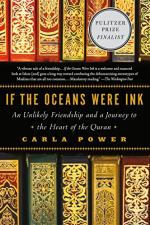|
This section contains 529 words (approx. 2 pages at 400 words per page) |

|
If the Oceans Were Ink Summary & Study Guide Description
If the Oceans Were Ink Summary & Study Guide includes comprehensive information and analysis to help you understand the book. This study guide contains the following sections:
This detailed literature summary also contains Topics for Discussion on If the Oceans Were Ink by Carla Power.
The following version of this book was used to create this study guide: Power, Carla. If the Oceans Were Ink. Henry Holt and Company, 2015, Kindle AZW file.
Carla Power spent much of her childhood traveling. The daughter of educated parents who embraced different cultures and ideas, Power already had some basic information about the Islamic faith. As an adult, Power worked for the Centre for Islamic Studies at Oxford and there met Sheikh Mohammad Akram Nadwi, a renowned scholar who became more well-known after Power wrote articles about his study of women in Muslim history. Akram unearthed names and stories of thousands of women who held major roles in the Muslim faith, including teachers, judges, and leaders. Those women make it clear that the modern-day Muslim attitude of keeping women hidden at home is not based on Muslim teachings. The Prophet Muhammad had wives in positions of power, including one who's writing became one of the major Muslim texts.
After her time at Oxford, Power became a journalist. She learned more about Muslims as she wrote about issues related to the Islam faith, but became aware that she had never written about the Quran and how Muslims related their beliefs to that ancient text. She decided to learn about the Quran personally and dedicated herself to studying for a full year with Akram as her teacher. She quickly learned that there were few definitive interpretations of verses from the Quran. Often, various people and groups interpreted the verses to mean whatever they wanted it to mean. An extremist who felt that Muslims should not associate with non-Muslims could interpret a verse to support that view, while others could interpret the same verse in an entirely different way. Akram said the most important aspect of interpretations is to keep God at the center of the interpretations. Akram said that too many people focus on themselves, and on what they want to get from the verses, ignoring what God might be trying to say.
Power includes historical information about the Quran and the Prophet Muhammad, as well as information from her exploration of Akram's interpretations and those of other writers. Through all that study, she learned that there were more similarities between the Islamic faith and other schools of thought.
Some of the major arguments against the Muslims and Quran hinge on the habit of keeping women hidden from view, out of positions of authority, and at home. The oppression of women has become a major point of contention, but Akram said that those are cultural attitudes rather than Muslim-dictated rules. The Quran says that women sometimes have duties in the home that might prevent them from attending the mosque for prayer times. Cultural traditions have changed to the point that many people no longer feel that women even have the right to attend a mosque.
By the end of her year of study with Akram, Power discovered that there was a deep message of peace and tolerance within the Quran for anyone who chose to study the word to find it. She did not become a follower of the Muslim faith, but was grateful for the deeper understanding.
Read more from the Study Guide
|
This section contains 529 words (approx. 2 pages at 400 words per page) |

|



